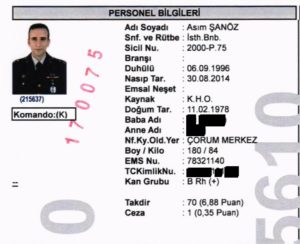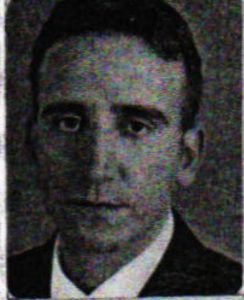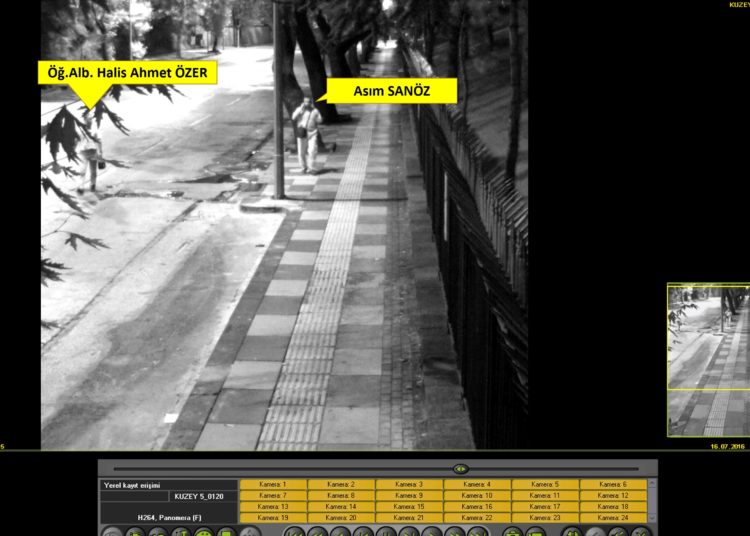Abdullah Bozkurt/Stockholm
Asım Şanöz, a major who worked as overseas planning officer at General Staff headquarters, accused Turkish the defense minister and the Land Forces commander of greenlighting torture at an illegal detention site at military headquarters.
Testifying at the Ankara 17th High Criminal Court on October 31, 2017, Şanöz identified Gen. Hulusi Akar, the then-chief of general staff, and Ümit Dündar, the Land Forces commander, as senior military officials who approved torture and ill-treatment of detainees unlawfully held at a shooting range located at General Staff headquarters.
The major testified that both Akar and Dündar saw him when he was taken to an illegal torture site some two weeks after a false flag coup attempt on July 15, 2016. He said he filed a criminal complaint with the court for alleged crimes against humanity. Yet, Şanöz’s pleas fell on deaf ears in the courtroom overseen by a panel of judges who did not enter his plea and declined to refer the complaint to a prosecutor’s office.
Şanöz explained how he was forced to agree to a false statement under torture by special forces as well as the police and later a prosecutor. He said he would make his statements in a court of law after spending 14 months in pre-trial detention during which he was denied access to the government’s evidence. His motions to collect surveillance footage at General Staff headquarters for his defense was refused with no explanation.
Maj. Asım Şanöz’s testimony on the torture he was subjected to:
On Friday July 15, 2016 Şanöz went to the headquarters and worked like any other routine business day. He asked for Monday off to deal with a renovation of his apartment that was due to start on Sunday. He left the office around 6 p.m. and went home. He started getting ready for the renovation, covering furniture and other belongings.
Around 1 a.m. on July 16, he received a call from the office to come in and help his commanders at the headquarters. He went to the General Staff as ordered and found himself in the middle of chaotic events during which special forces and the chief of general staff’s bodyguards were deployed to protect the headquarters against what they believed was a terrorist threat.
He was told to shelter in his office by the bodyguards, who were scrambled to beef up security in and around the perimeter of the headquarters. He spent the night trying to stay away from clashes. He went home in the morning and came back to work on Monday. Col. Remzi Albasan, chief of staff to head of the Turkish military Gen. Akar, assigned Şanöz to his team, where he had worked for two weeks, staying late to keep up because of a personnel shortage and the mass detention of military officers.

On August 2 he went to work as usual. At 9:30 a.m., Col. Mustafa Köksal came to his office and ordered a sergeant to take him away without explanation. Şanöz had no idea what was happening. He was handcuffed and put in detention in a room located on the Personnel Directorate floor. He tried to ask for an explanation, but Köksal told him to not waste his breath and that he would soon be questioned somewhere else.
Later he and others who were also handcuffed and joined him in the same room were taken to a shooting range on the headquarters compound by special forces. The General Staff blatantly ignored the rules of criminal procedure, which required military officers in detention to be processed by Central Command and later turned over to the police.
The torture area at the shooting range was supervised by brigadier generals Oğuz Tozak and Ertuğrul Erbakan. They were trying to fill the gaps in the scenario created by prosecutor Savcı Serdar, who was desperately attempting to find witnesses to support the government’s storyline on the coup events.
The transfer document by Central Command shows Şanöz was picked up from the illegal detention site where he was tortured. The document confirms his testimony:
Mehmet Akçara, another detainee who was taken away along with Şanöz and tortured at the shooting range at the same time, testified in court on November 14, 2017 how generals Tozak and Erbkan asked him to incriminate his colleagues before the torture session. “They said, ‘We know you’re innocent, but public prosecutor Serdar Coskun needs witness statements to prove that some of the people in the cabinet of Chief of General Staff [Akar] are Gülenists’,” he told the court. When he refused to falsely accuse others, he was beaten and tortured.
Like Akçara, Şanöz went through the same ordeal. They first put him on a concrete floor, blindfolded. He waited there while others were being tortured. “From the sounds coming from the inside the shooting range, I realized that the first person they took inside was Kübra Yavuz. Someone was interrogating her by shouting and threatening her,” he recalled. Yavuz was a lieutenant working as a protocol officer at the General Staff.
Four hours later, Şanöz was taken away for interrogation as well. When he started explaining what he had experienced on the night of the coup, his interrogators were not happy with what they heard. They were not interested in the truth. One threatened him, saying: “Look, I’m preparing the [torture] tools here. I’ll take my time experimenting with them on you until morning,” according to Şanöz’s recollection of the ordeal.
Surveillance footage from CCTV shows that Maj. Asım Şanöz and his colleagues left General Staff headquarters on July 16 in civilian clothes:
He was subjected to water boarding multiple times to force him to accept a prepared statement. Every time Şanöz said he was innocent of all accusations, the torture intensified.
At one point, he was put in a chair and electrocuted. “They did this for brief periods to avoid any burn marks on my body,” he said. He was asked to falsely accuse his colleagues of terrorism and serve as a witness in order for the torture to stop. When he refused, he was beaten severely. In the end, his torturers left him lying on the concrete floor in wet clothes until the next morning.
He was later transferred to Central Command for formal processing. The record of transfer, obtained by Nordic Monitor, verified Şanöz’s statement that he was kept at the shooting range when the Central Command guards assumed custody. The guards verified the location as the shooting range in the record.
Şanöz managed to enter the torture claim in a medical report prepared by a military doctor at the request of Central Command. The document stated that Şanöz was not abused or tortured while he was in the custody of Central Command but was tortured during interrogation by special forces at the shooting range.
Medical report issued by a doctor while Şanöz was in the custody of Central Command recorded his claims of torture at the illegal detention site:
Central Command later transferred him to police custody, during which he was to experience a new round of abuse, ill-treatment and torture. The police put him in a makeshift detention site at Gazi University’s Başkent Sports Hall where he was subjected to torture for six days.
One of the medical reports, prepared by doctors while Şanöz was in police custody, identified some evidence of torture on his body. All other reports claimed he was healthy and had not endured any torture or abuse. Doctors were often threatened by the police to not record any torture marks on detainees, and they often complied with this, providing a clean bill of health for victims who were clearly beaten, tortured and abused.
On August 9, 2016 when police took him to the prosecutor’s office for a deposition, Şanöz was exhausted, broken, disoriented, malnourished and had difficulty collecting his thoughts. He was kept standing in the courtroom corridor for hours and was denied food and water there as well. The police even refused to let him sit on the benches in the waiting room. His encounter with a bar-appointed lawyer was quick under police pressure.

When he was finally taken to investigating prosecutor Serdar Coşkun’s office, he realized the prosecutor was not interested in hearing about the coup. According to Şanöz’s testimony, the prosecutor said he did not want the major to talk about July 15, but rather asked him to accuse others as accomplices and falsely identify them as Gülenists, a group that the government of President Recep Tayyip Erdoğan blamed for the coup attempt.
The Gülen group and its leader Fethullah Gülen, a Turkish Muslim scholar resident in the US, have repeatedly denied having any role in the coup, and the Turkish government has failed to present any evidence linking Gülen to the coup.
In a quick arraignment by judge Mehmet Beyhan Seçkin, Şanöz was formally arrested and jailed. In his defense, he said he went to General Staff headquarters as ordered by Akar’s cabinet, in civilian clothes and unarmed. He said if he was a putschist, he would have taken his firearm and come dressed in uniform.
At the end of a sham trial, Şanöz was convicted and handed down 10 aggravated life sentences on June 20, 2019. The Ankara Regional Appeals Court upheld his conviction in October 2020.
Another medical report that recorded some of the marks of torture on Maj. Asım Şanöz:
In the meantime, his torturers got away with what they did to Şanöz and many others. As of today, no prosecution has been initiated against people who tortured detainees at unofficial sites despite multiple complaints filed by the victims and their lawyers.
Torturers in Turkey were protected by a government decree issued by President Erdoğan that provided blanket immunity for officials who were involved in coup investigations. Decree-law No. 667, issued by the government on July 23, 2016, granted sweeping protection for law enforcement officers in order to prevent victims from pressing complaints of torture, ill treatment or abuse against officials. There were multiple cases in which Turkish prosecutors refused to investigate torture allegations, citing this decree-law, or KHK (Kanun Hükmünde Kararname).
Most doctors who examined Maj. Şanöz declined to make a record of the torture and abuse he had suffered for fear of the police:
Article 9 of this KHK stated that “legal, administrative, financial and criminal liabilities shall not arise in respect of the persons who have adopted decisions and fulfill their duties within the scope of this decree-law.” The decree was criticized by human rights organizations for being a clear violation of articles of the International Covenant on Civil and Political Rights (ICCPR) as well as the European Convention on Human Rights, to which Turkey is a party, yet it was never annulled. In fact, the Turkish parliament passed the decree into law on October 18, 2016.
Full text of Maj. Asım Şanöz’s testimony:












